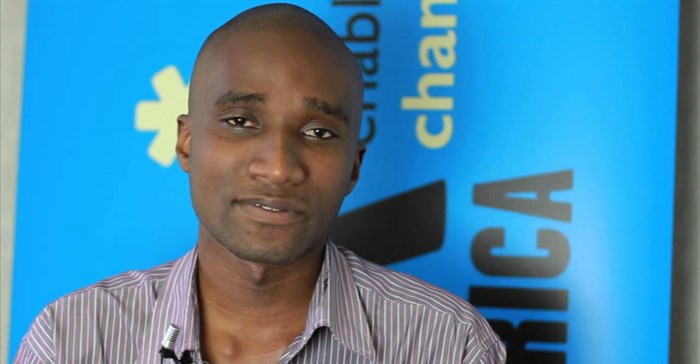
Eliot Chisango
Chisango is now in charge of environmental management research and implementation at the foundation, focusing on waste management and recycling in rural communities. We interviewed him as part of our Youth Month coverage to find out what drew him to the environmental sector, and how Africa's resource challenges should be addressed.
Tell us a bit about what you do at the P.E.A.C.E Foundation.
As means of a background, the P.E.A.C.E Foundation addresses rural poverty in South Africa. P.E.A.C.E being an acronym for Planning, Education, Agriculture, Cooperatives and Environment. I fall under Environment, focusing on waste management and recycling in rural communities. The strategy is to set up recycling buyback centres which facilitate waste collection (using trolleys on foot, customised donkey carts and vehicles), sorting and selling in order to generate an income. Currently, we have one centre, initiated in 2014 in Senwabarwana, Limpopo province. My role has been to manage the portfolio, fundraise for the project, mobilise all stakeholders concerned and ensure that donors and partners are updated on project progress and milestones. I’m also finishing off my Masters degree, wherein the current recycling centre is the focus of my dissertation so that we are able to validate our recycling model, particularly when we have to scale it up. I also assist with our in-house monitoring and evaluation for P.E.A.C.E projects.
What drew you to the environmental field?
I did my undergraduate degree in environmental studies (back in Zimbabwe). This was when I realised that there was a lot to know within the environmental space. Back then, however, I was interested in the technical aspects such as environmental impact assessments and other related field work. Starting off with the P.E.A.C.E Foundation in 2010 then opened other avenues for me to explore. I only knew of recycling just as something we had to do to keep our environment clean, and the social and economic aspects I never knew existed. Back home in Zimbabwe, recycling is not as big as it is here in South Africa, and working for P.E.A.C.E gave me a totally different perspective to how I viewed recycling and environmental issues. The understanding that waste can be a resource and economic good which can contribute positively to development was new to me. The approach that the P.E.A.C.E Foundation takes to rural development is different, and I think that is one of the organisation’s greatest strengths, making it quite unique.
Today's generation has the monumental task of ensuring a paradigm shift away from business as usual. How do we ensure sustainable development is implemented meaningfully across sectors?
I would say the paradigm shift has to start from within. Understanding that regardless of age and status, we all have a duty to work together for a common good is essential. This goes beyond thinking of oneself, but consideration for the next person and for future generations. It's everyone’s social responsibility to ensure that we take care of our God-given resources, because once we lose them, they are gone forever. The task is therefore upon government, business and all citizens to find common ground and work together in a responsible manner. Communities need to be heard and be given a voice, business has to be economically, socially and environmentally accountable, and government needs to provide an enabling environment for development to take place.
What are some of the resource challenges future African generations will face?
I am tempted to look at this financially, but I think the single biggest challenge we will face on this continent, if unchecked, would be the challenge with our natural resources. what we have in the soil (minerals and agricultural products), our water, air quality and wildlife, these are resources that are being depleted at a rate faster than we can repair/replace them. I believe that Africa’s riches and uniqueness lie within her natural resources, and without these, there will be no meaningful economic development. Other challenges such as those within human resources and financial capacity constraints might be viewed as secondary challenges caused by the effect of mismanaging our natural resources. Our natural resources not only anchor our lives, but they also form the basis of our development as a continent.
What are the best ways for us to approach these challenges?
There again, I would say a mindset shift is essential. Realising that the fate of future generations is determined by what we do today should guide us on how we utilise our natural resources. Circumstances can push us to think of immediate financial gains (at the expense of natural resources), but we need to realise that no amount of financial gain can ever compensate for our natural resource depletion. Sustainable development entails integrating the social, economic and environmental aspects to enhance human development, and what better way to meet this development than preserving it for generations to come?
Young or old, who inspires you?
I would say my family, the team at P.E.A.C.E Foundation and my girlfriend. I have learnt a lot from all these people, and they continue to inspire me daily.
Any words of encouragement for those wanting to follow in your footsteps?
The only way to learn is through trying and believing. Mistakes are also a great learning curve. Look up to people who have walked a similar path; you stand to gain from their advice and experience. Above all, learn to grow spiritually.
Chisango's plans for the future include reinforcing the current model P.E.A.C.E. has developed in Senwabarwana, Limpopo, scaling this up and replicating it throughout rural South Africa and beyond.






































